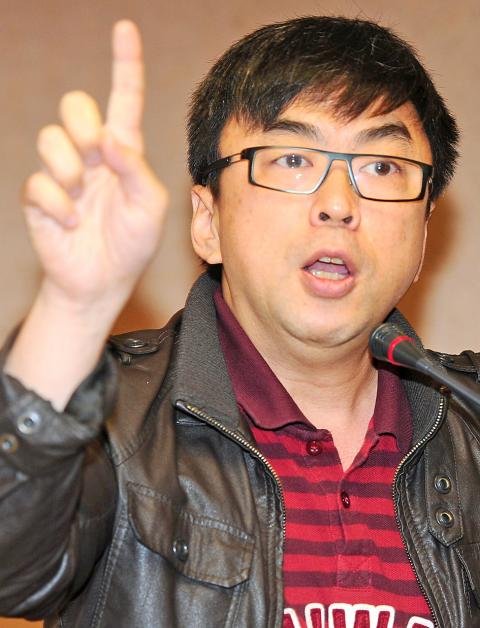Democratic Progressive Party (DPP) legislators yesterday criticized the Mainland Affairs Council (MAC) for listing information on the disadvantages of the cross-strait service trade agreement as classified and releasing only information it considers favorable to the agreement.
Although President Ma Ying-jeou (馬英九) has repeatedly said that approving the service trade agreement will have more advantages than disadvantages for Taiwanese businesses, DPP lawmakers said the government seems to be hiding certain information that may show the agreement in a disadvantageous light.
“In 2011, before the agreement was signed, the government commissioned the Chung-Hua Institution for Economic Research to conduct research on the pros and cons of the agreement. The results of that research show that the agreement may lead to the loss of key technologies, stronger competition from China and loss of business ownership,” DPP Legislator Tuan Yi-kang (段宜康) said during a question-and-answer session at a meeting of the legislature’s Internal Administration Committee.

Photo: Chang Chia-ming, Taipei Times
“That information has been listed as classified and has been hidden from the public,” Tuan said.
In addition, an assessment report on the pact submitted by the National Security Bureau (NSB) concluded that opening the telecommunications industry to China may threaten Taiwan’s national security, but that report has been classified, the lawmaker said.
Tuan also accused the council of hiding poll results that showed 62.9 percent of respondents supported a call by activists who occupied the Legislative Yuan from March 18 to April 12 for the agreement to be renegotiated, and only 23 percent were opposed to it.
“I could understand if you decide to hide information about something advantageous to us during negotiations for the trade pact, but why are you trying to hide from the public what is bad for us?” Tuan said.
“It is also questionable why you are only releasing poll results that are favorable to the government’s stance,” Tuan said.
DPP Legislator Lee Chun-yi (李俊俋) asked similar questions.
“I could understand that you may want to hide some information during talks on the trade pact, but it does not make sense that it is still classified now that the pact has been signed,” Lee said.
Responding to the questions, Mainland Affairs Council Minister Wang Yu-chi (王郁琦) said that the classified information was to be used for reference only within the government.
“We never intended to release the information to the public,” he said.
Wang also said that there was much more undisclosed information showing advantages of the service trade agreement than showing the disadvantages, “but since this data is also for internal reference, we have not released that information either.”
Deputy Minister of Economic Affairs Cho Shih-chao (卓士昭) said that research produced by academics is only used for internal reference for decisionmaking.
“Academic research is not the only reference used; we also have to talk with business leaders before making a final decision,” the deputy minister said.
However, neither official explained why some poll numbers have been released to the public, while others were not.

A preclearance service to facilitate entry for people traveling to select airports in Japan would be available from Thursday next week to Feb. 25 at Taiwan Taoyuan International Airport, Taoyuan International Airport Corp (TIAC) said on Tuesday. The service was first made available to Taiwanese travelers throughout the winter vacation of 2024 and during the Lunar New Year holiday. In addition to flights to the Japanese cities of Hakodate, Asahikawa, Akita, Sendai, Niigata, Okayama, Takamatsu, Kumamoto and Kagoshima, the service would be available to travelers to Kobe and Oita. The service can be accessed by passengers of 15 flight routes operated by

Chinese spouse and influencer Guan Guan’s (關關) residency permit has been revoked for repeatedly posting pro-China videos that threaten national security, the National Immigration Agency confirmed today. Guan Guan has said many controversial statements in her videos posted to Douyin (抖音), including “the red flag will soon be painted all over Taiwan” and “Taiwan is an inseparable part of China,” and expressing hope for expedited reunification. The agency last year received multiple reports alleging that Guan Guan had advocated for armed reunification. After verifying the reports, the agency last month issued a notice requiring her to appear and explain her actions. Guan

GIVE AND TAKE: Blood demand continues to rise each year, while fewer young donors are available due to the nation’s falling birthrate, a doctor said Blood donors can redeem points earned from donations to obtain limited edition Formosan black bear travel mugs, the Kaohsiung Blood Center said yesterday, as it announced a goal of stocking 20,000 units of blood prior to the Lunar New Year. The last month of the lunar year is National Blood Donation Month, when local centers seek to stockpile blood for use during the Lunar New Year holiday. The blood demand in southern Taiwan — including Tainan and Kaohsiung, as well as Chiayi, Pingtung, Penghu and Taitung counties — is about 2,000 units per day, the center said. The donation campaign aims to boost

The Central Weather Administration (CWA) said a magnitude 4.9 earthquake that struck off the coast of eastern Taiwan yesterday was an independent event and part of a stress-adjustment process. The earthquake occurred at 4:47pm, with its epicenter at sea about 45.4km south of Yilan County Hall at a depth of 5.9km, the CWA said. The quake's intensity, which gauges the actual effects of a temblor, was highest in several townships in Yilan and neighboring Hualien County, where it measured 4 on Taiwan's seven-tier intensity scale, the CWA said. Lin Po-yu (林柏佑), a division chief at the CWA's Seismological Center, told a news conference